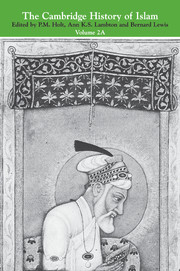Book contents
1 - SOUTH-EAST ASIAN ISLAM TO THE EIGHTEENTH CENTURYo
from Part VI - SOUTH-EAST ASIA
Published online by Cambridge University Press: 28 March 2008
Summary
The coming of Islam
On the whole, accounts of conversion to Islam in Malay and Indonesian literature and tradition are not very reliable, however numerous they may be. There is a kind of uniformity about them which does not ring true. Often the ruler, destined to be the first among his people to pronounce the ‘Two Words’ (the profession of faith), the mere utterance of which will make him a member of the Muslim community, has already received notification of this in a dream or vision, even before the apostle of Islam drops anchor off his shores. Generally his conversion is immediate, with his subjects following soon after. There is no lack of wonders and miracles: opponents are easily persuaded or overawed by magic.
Yet the historian cannot afford to ignore such accounts. They shed a great deal of light on the nature of these societies and their organization, as well as providing clues as to the way Islam was in fact introduced amongst them.
An analysis of these stories suggests that Islam was propagated in South-East Asia by three methods; that is by Muslim traders in the course of peaceful trade, by preachers and holy men who set out from India and Arabia specifically to convert unbelievers and increase the knowledge of the faithful, and lastly by force and the waging of war against heathen states.
- Type
- Chapter
- Information
- The Cambridge History of Islam , pp. 121 - 154Publisher: Cambridge University PressPrint publication year: 1977



